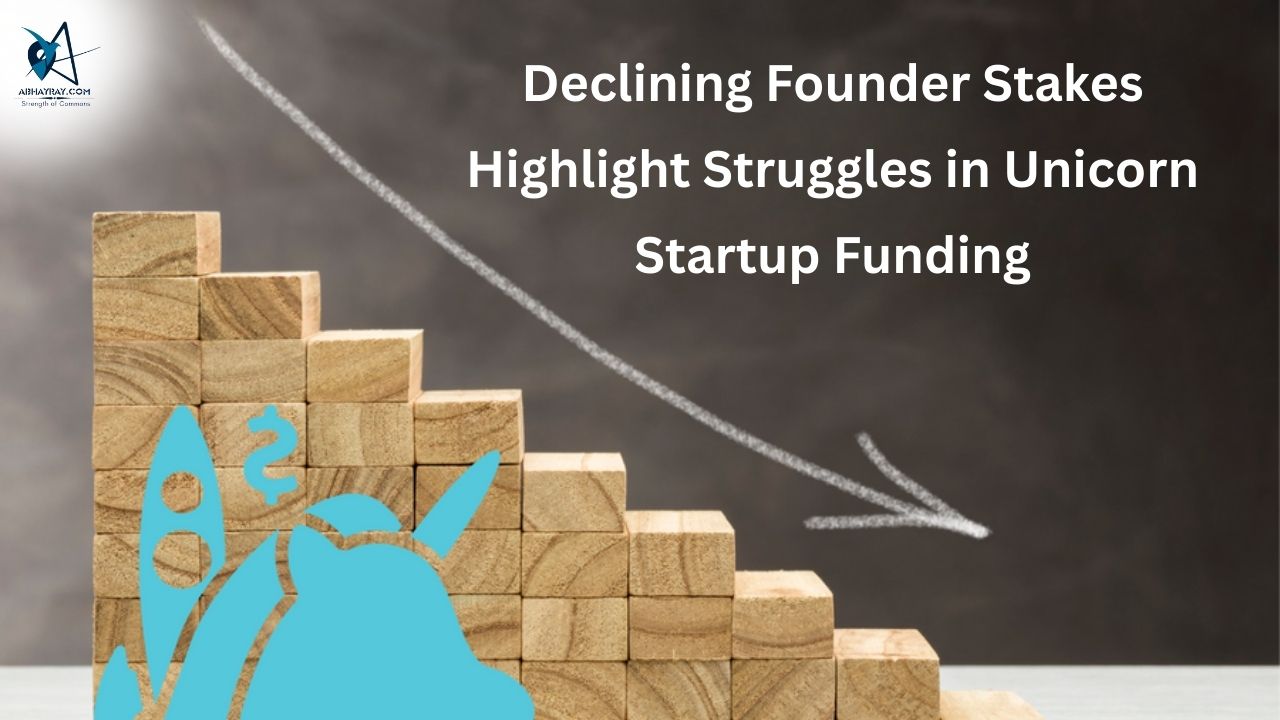Introduction
Over the last six years, the stakes held by founders in India’s unicorn start-ups have witnessed a sharp decline. The trend stems mainly from company heads diluting their ownership to raise capital in a tough funding climate. The median stake that founder groups hold in their unicorn start-ups has steadily declined over the past six years from 24.6% in 2018 to just 13% in 2024.
Access to Capital Amid a Funding Crunch
Amid a challenging funding environment, many founders are facing increased pressure to secure capital for their startups. Venture capital firms are being more selective and cautious in their investments due to economic uncertainty and market slowdowns. As a result, startups are offering larger equity stakes to attract investors. Founders, in turn, are forced to dilute their ownership to access the necessary funds for scaling, product development, and market expansion. This trend reflects the growing difficulty of raising capital in a tighter investment landscape, where securing financial backing often comes at the cost of reduced founder control and ownership.
How Investor Demands Are Shaping Founders’ Stakes
Investor demands significantly influence the stakes that founders retain in their startups. As startups progress through various funding rounds, founders often face the challenge of balancing the need for capital with the desire to maintain control and ownership.
Key Points :
- Equity Stakes : Equity stakes represent ownership in a company, usually in the form of shares. Investors with equity stakes often have a say in the company’s direction and key decisions.
- Dividing Equity : Splitting equity among co-founders is crucial. Factors like skills, contributions, time commitment, financial investment, and risk taken by each founder play a role in determining the equity split.
- Funding Rounds : As startups move through funding rounds (Seed, Series A, B, C, etc.), founders’ stakes typically dilute. For example, at the end of the seed round, founders might retain a median ownership stake of 72%, which can decrease to around 28% by the end of Series C.
- Protecting Founder Equity : Founders need to understand valuation calculations,investor motivations, and effective term sheet negotiation to protect their equity. Structuring investor agreements wisely and preserving control mechanisms are pivotal.
Data from 102 Unicorns were collected
The data includes information collected from India’s 102 unicorn start-ups valued at or over $1 billion. The trend comes amid a wave of resignations among founders at leading start-ups, who are stepping down due to market pressures, sectoral challenges, or to start new ventures.
Ongoing Funding Winter to Blame
Industry stakeholders attribute the dilution of founder shares to the ongoing funding winter. This has forced founders of most start-up businesses, including unicorns, to prioritize unit economics, cutting the burn and extending cash runways.
Sandeep Murthy, Managing Partner at early-stage venture capital firm Lightbox said, “In a challenging funding environment, if the choice is between taking a little bit of a knock on ownership to raise fresh capital or letting the business shut down, most founders would choose the former.”
A Sign of a Maturing Ecosystem
Some experts see this trend as a sign of a maturing ecosystem, where founders are more willing to give up share to secure capital and scale rapidly. V Laxmikanth, Managing Partner at Pavestone Capital, said, “It is the maturity of the founders to understand that, in order to scale, they need a lot more expertise and capital.”
- Global Economic Factors : The recent global economic slowdown has had a ripple effect on the startup ecosystem. Economic uncertainties, inflation, and interest rate hikes have made venture capital firms more cautious. Consequently, many startups have had to adjust to a tougher funding climate, leading to increased dilution for founders who must adapt to the changing investor landscape.
- Shifts in Investor Strategy : Investors are taking a more conservative approach, focusing on the long-term viability of startups rather than rapid expansion. This often results in stricter terms and higher demands for equity in exchange for financial backing, prompting founders to reduce their ownership.
A Strategic Move by Founders and Role Shifts
Reducing ownership in start-ups could also be a strategic move by founders to sidestep increasing regulatory scrutiny, particularly for firms that are close to going public. This could also help them evade the compliance burdens. Despite the trend, some founders still own a majority stake in their companies. As the funding environment continues to improve, investors expect the ownership dilution pattern among founders to stabilize.
- Co-Founder Departures : A number of unicorn startups have experienced changes in leadership, with some co-founders stepping down or reducing their involvement. This can result in a reconfiguration of the ownership structure, where departing founders may sell or dilute their stakes.
- Shift in Company Leadership : In some cases, as companies grow, they bring in new leadership, including professional managers or executives, which can lead to a shift in ownership structure. Founders may choose to sell off part of their stake to make room for new key players.
Conclusion
The decline in founder stakes in unicorn startups reflects the broader challenges of the current funding environment. As investors become more cautious and demand higher equity in exchange for capital, founders are forced to dilute their ownership to secure the necessary resources for growth and expansion. This trend highlights the increasing pressures faced by startup founders, who must balance maintaining control with meeting the financial demands of scaling their businesses. While this dilution may affect founder influence, it underscores the evolving dynamics in the startup ecosystem, where securing capital has become more challenging and competitive than ever before.
GMICapitals.com RaysVeda.com GetMyStartup.com LawCanal.com GetMyIndia.com ZinCob.com Angeltors.com

